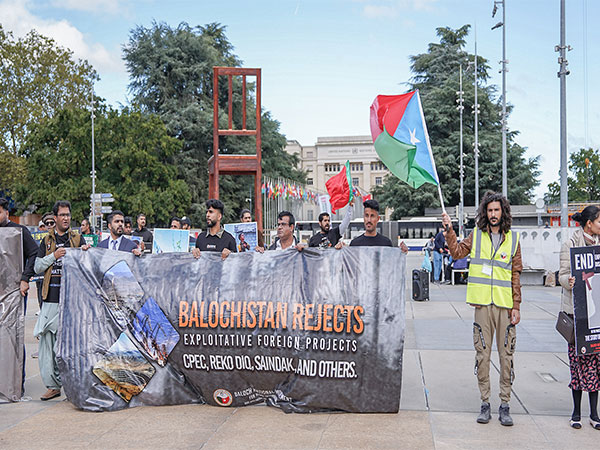Baloch photographers exhibit stories of hardship and struggle as they protest at UNHRC
A large number of attendees participated in the exhibition on Wednesday, where BNM members educated the audience about the dire situation in Balochistan and how the Pakistani state continues to violate international law with impunity

- Country:
- Switzerland
During the 57th session of the United Nations Human Rights Council, the Baloch National Movement (BNM) organised a photo exhibition outside the United Nations office in Geneva, in front of the Broken Chair. The exhibition featured images submitted by Baloch photographers, aiming to present the harsh realities of Balochistan through their lenses. A large number of attendees participated in the exhibition on Wednesday, where BNM members educated the audience about the dire situation in Balochistan and how the Pakistani state continues to violate international law with impunity. This photo exhibition was part of BNM's three-day campaign in Geneva, which began with the organization's 5th International Conference on Monday, followed by a protest outside the United Nations Office on Tuesday, and concluded with the photo exhibition on Wednesday.
The exhibition drew considerable interest, vividly showcasing the struggles and hardships faced by the Baloch population. Attendees were offered poignant visual insights into the severe consequences of military operations, enforced disappearances, and resource exploitation in the region. BNM activist Naseem Baloch stated, "These war crimes and acts of brutality are not a recent development. They date back to 1948 when Pakistan forcefully occupied Balochistan. Since then, the Baloch people have been resisting this illegal occupation."
He highlighted that a significant independence movement is being witnessed among the Baloch masses, while Pakistan is attempting to suppress this resistance through brutal policies. Full-scale military operations are currently being conducted throughout Balochistan by Pakistani forces and intelligence agencies, intensifying the struggle for autonomy and exacerbating the suffering of the local population. Naseem Baloch further emphasized, "Today, we can say that Balochistan is under military garrison and has been transformed into a slaughterhouse. Daily, Baloch people--youth, women, and men--are being killed, abducted, or tortured. This is not a new phenomenon caused by Pakistani forces."
Additionally, he addressed China's involvement, stating, "Exploitation and brutality are being joined in by China. The economy of Pakistan is being fueled by Chinese projects, allowing power to be gained by Pakistan through these initiatives. Thus, complicity in the genocide of Balochistan is being exhibited by China through exploitative projects like the China-Pakistan Economic Corridor and the Sandak gold project. On one hand, genocide is being committed, while on the other, resources are being plundered without the consent of our people." Naseem Baloch also criticized the Pakistani government, saying, "They have established a puppet government in the name of democracy, but we know, and the world knows, that Pakistan is being run by military generals. There is no real democracy for us nor in other parts of Pakistan. We are here to raise our voices all around the world, particularly to the United Nations during its Human Rights Council session, demanding accountability from Pakistan for these human rights violations and heinous crimes."
The photo exhibition attracted significant attention, offering a stark portrayal of the miseries endured by the Baloch population. Visitors received a visual insight into the devastating impacts of military operations, disappearances, and resource exploitation in the region. Niaz Baloch, a central committee member of the Baloch National Movement, remarked, "As we stand before the United Nations building, we bring stories from Balochistan--stories that the world has ignored for decades, stories that no one in this modern world believes or has heard. The Baloch photographers have sent us pictures; we wanted to portray a true picture of Balochistan through their lenses."
He further noted, "Yesterday, we organized a protest to highlight human rights violations in Balochistan to the world. The Baloch National Movement has initiated a series of awareness campaigns and advocacy efforts across various forums to highlight the Baloch national issue and to forge alliances for Baloch national liberation. We hope that through our awareness campaign, we have brought these images to light, and through the struggle of the Baloch National Movement, one day the Baloch Nation will find its allies and achieve freedom." The protest also garnered support from Uyghur activists, who joined forces with the Baloch to denounce China's role in the China-Pakistan Economic Corridor (CPEC) project. This project connects Balochistan's Gwadar port to Xinjiang, where Uyghurs have similarly faced severe state repression. (ANI)
(This story has not been edited by Devdiscourse staff and is auto-generated from a syndicated feed.)
ALSO READ
Punjab govt says negotiations are going on at various levels with the protesting farmers and efforts are being made to shift Dallewal to hospital.
Baloch Showdown: Hub Chowki Protest against State Brutality
Shutdown and Hunger Strike in Holy Town: Protests Rock Katra Against Ropeway Project
Punjab Government Seeks Extension for Farmer Leader's Medical Aid Amidst Protests
Priests Protest: Kejriwal's Scheme Sparks Controversy










